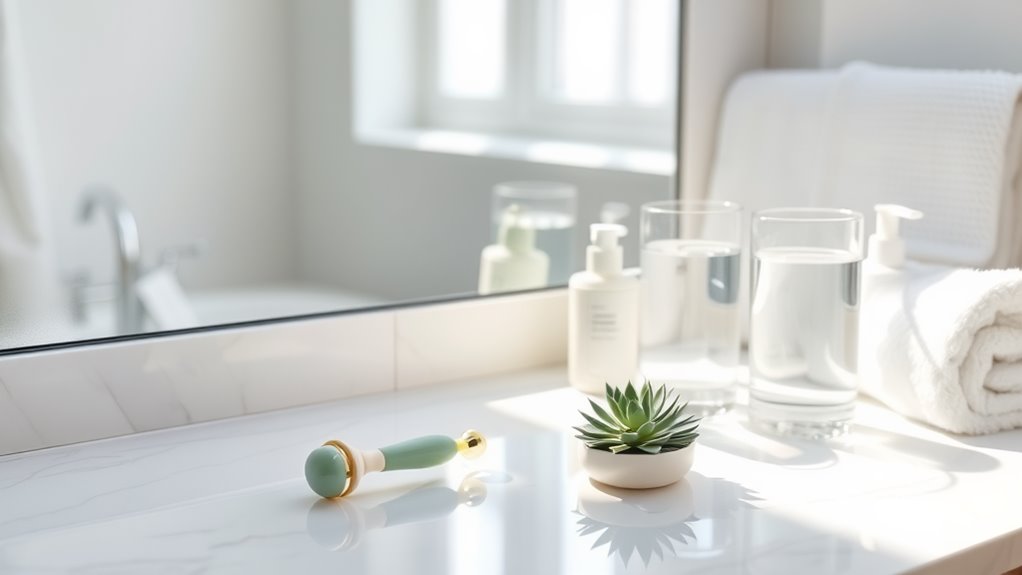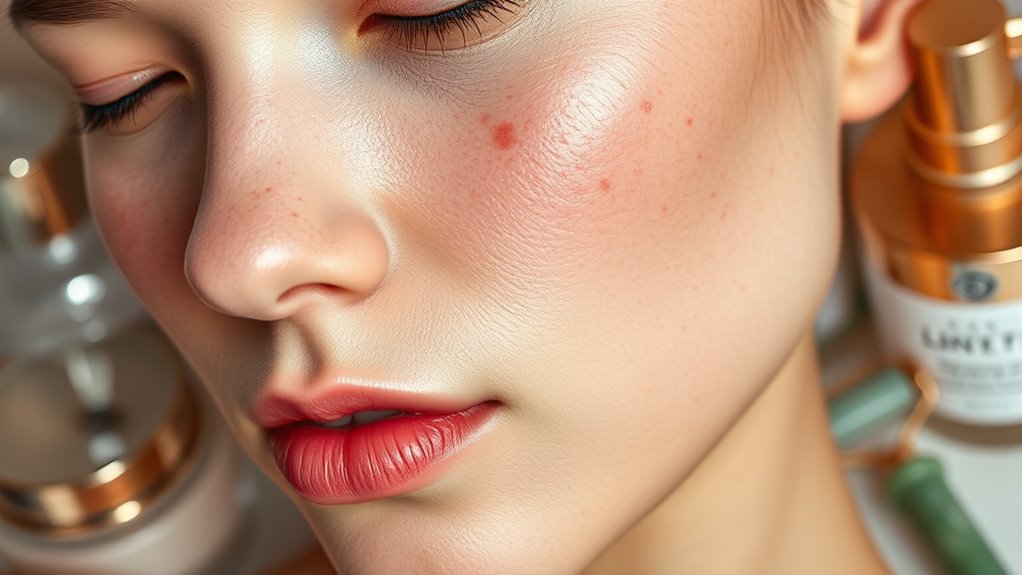This One Routine Fixed My Sensitive Skin for Good
To fix your sensitive skin for good, establish a consistent skincare routine. Start with a gentle cleanser free of harsh ingredients, followed by a soothing toner with calming agents like aloe vera. Daily application of broad-spectrum sunscreen is essential to protect your skin. Minimize makeup to allow your skin to breathe, and gently exfoliate once or twice a week. By tracking your progress, you can fine-tune your routine for optimal results. Discover more strategies for success ahead.
Key Takeaways
- Establish a consistent skincare routine to strengthen the skin barrier and minimize reactions to irritants over time.
- Use gentle, pH-balanced cleansers free from sulfates and fragrances to avoid irritation while maintaining hydration.
- Incorporate soothing serums with ingredients like hyaluronic acid and niacinamide to enhance skin resilience and texture.
- Apply broad-spectrum sunscreen daily to protect sensitive skin from UV damage and prevent inflammation.
- Monitor progress with a skin diary, noting reactions and improvements to refine your routine effectively.
Understanding Sensitive Skin
Understanding sensitive skin is crucial because it requires special attention and care. Sensitive skin often reacts adversely to various environmental factors, including temperature changes, allergens, and certain skincare ingredients.
This heightened reactivity is primarily due to a compromised skin barrier, which fails to retain moisture and protect against irritants. To develop an effective sensitive skin solution, you must prioritize formulations with soothing, hypoallergenic ingredients such as ceramides, niacinamide, and aloe vera. Additionally, recognizing the key symptoms of sensitive skin can help you tailor your skincare routine effectively.
Avoid products containing alcohol, fragrances, or harsh exfoliants, as they can exacerbate sensitivity. Regularly moisturizing helps reinforce the barrier, reducing irritation.
Identifying Your Skin Triggers
How can you pinpoint what irritates your sensitive skin? Start by maintaining a detailed skin diary. Document every product you apply, including cleansers, moisturizers, and makeup, alongside your skin’s reactions. Note the timing of any flare-ups to identify patterns.
Pay attention to environmental factors as well—changes in weather, humidity, and exposure to allergens can exacerbate sensitivity. Perform patch tests with new products on a small skin area to gauge reactions before full application.
Additionally, consider dietary influences; certain foods can trigger inflammatory responses. By systematically analyzing these variables, you’ll gain insight into your specific triggers. This methodical approach empowers you to make informed choices, ultimately leading to a more resilient skin barrier and reduced irritation. Furthermore, adopting soothing solutions tailored for sensitive skin can enhance your overall skincare routine.
The Importance of a Consistent Routine
After identifying your skin triggers, establishing a consistent skincare routine becomes vital for managing sensitive skin.
A well-structured regimen allows your skin to adapt, minimizing reactions to irritants and promoting healing. Consistency helps in maintaining the skin’s barrier function, which is crucial for preventing moisture loss and external damage. Regular application of suitable products can also enhance their effectiveness, as active ingredients require time to show results. You should aim for a routine that balances cleansing, hydration, and protection, tailored to your skin’s specific needs. Additionally, incorporating gentle cleansing methods can significantly improve your skin’s overall health and resilience.
Choosing Gentle Cleansers
What should you look for in a gentle cleanser to effectively care for sensitive skin? First, prioritize formulations devoid of harsh sulfates and fragrances, which can irritate delicate skin.
Look for key ingredients like glycerin or hyaluronic acid, which hydrate while cleansing. Opt for pH-balanced options; these maintain skin’s natural barrier, preventing further sensitivity. Incorporating a routine that emphasizes gentle cleansing can also significantly enhance hydration without over-drying.
Creamy or gel-based cleansers often provide a milder effect compared to foaming types. Additionally, check for soothing agents like aloe vera or chamomile, known for their calming properties.
Lastly, consider non-comedogenic products to avoid clogged pores, ensuring your skin remains clear and healthy.
Incorporating Soothing Toners
Incorporating soothing toners into your skincare routine can enhance hydration and balance your skin’s pH. You’ll want to look for ingredients like chamomile and aloe vera, which are known for their calming properties. Proper application techniques, such as using a cotton pad or your hands, can maximize their effectiveness on sensitive skin. Additionally, using gentle cleansers can support the natural skin barrier, ensuring your skin remains resilient and healthy.
Benefits of Soothing Toners
While your skin may react sensitively to various products, incorporating soothing toners into your routine can provide significant benefits.
These toners help restore your skin’s pH balance after cleansing, which is crucial for maintaining a healthy barrier. They can enhance hydration and absorption of subsequent products, ensuring your skin receives optimal nourishment.
Soothing toners also contain anti-inflammatory properties that can calm redness and irritation, making them essential for sensitive skin management. By reducing inflammation, they promote a more even skin tone and texture.
Additionally, the gentle astringent effects of toners can minimize the appearance of pores, contributing to a smoother complexion.
Ingredients to Look For
When selecting a soothing toner, it’s essential to look for ingredients that directly address the needs of sensitive skin.
Prioritize calming agents like chamomile and calendula, known for their anti-inflammatory properties. Aloe vera is another excellent choice; it hydrates while reducing irritation.
Look for hyaluronic acid, which draws moisture to the skin, enhancing its barrier function. Additionally, consider toners with niacinamide, as it strengthens the skin’s defenses and minimizes redness.
Avoid alcohol and synthetic fragrances, which can exacerbate sensitivity. Lastly, green tea extract offers antioxidant benefits, protecting your skin from environmental stressors.
Application Tips and Techniques
To effectively incorporate soothing toners into your sensitive skin routine, start by ensuring your skin is clean and free of any residual makeup or impurities. Apply your toner using a cotton pad or your palms, depending on your preference. If using a cotton pad, gently swipe the toner across your face, avoiding sensitive areas. When using your palms, press the toner into your skin for better absorption.
| Application Method | Benefits |
|---|---|
| Cotton Pad | Even distribution, exfoliation |
| Palming | Enhanced absorption, hydration |
| Spray | Quick application, refreshing |
| Layering | Customizable hydration levels |
Selecting the Right Moisturizers
Choosing the right moisturizer for sensitive skin is crucial, as it can significantly impact your skin’s health and comfort.
Look for products containing soothing ingredients like aloe vera, chamomile, or calendula, which help calm irritation. Opt for formulations that are fragrance-free and hypoallergenic to minimize the risk of reactions.
Additionally, consider moisturizers with ceramides or hyaluronic acid, which enhance the skin’s barrier function and maintain hydration. Avoid heavy oils and alcohol-based ingredients, as they may exacerbate sensitivity.
Always perform a patch test before full application to ensure compatibility.
The Role of Serums in Your Routine
Serums play a vital role in your skincare routine, especially for sensitive skin, as they deliver concentrated active ingredients directly to the skin.
These lightweight formulations penetrate deeper than creams, allowing for targeted treatment of specific concerns such as redness, irritation, and hydration.
Look for serums containing soothing ingredients like hyaluronic acid, niacinamide, or chamomile, which can enhance your skin’s resilience.
Applying a serum after cleansing and before moisturizing maximizes absorption and efficacy.
It’s crucial to patch-test new serums to prevent adverse reactions.
Regular use can lead to significant improvements in skin texture and barrier function, ultimately minimizing sensitivity.
Sunscreen: A Non-Negotiable Step
Applying sunscreen daily is crucial for protecting your sensitive skin from harmful UV rays.
You should choose a broad-spectrum formula to shield against both UVA and UVB radiation effectively.
This step not only prevents sunburn but also reduces the risk of long-term skin damage and aging.
Daily Application Importance
While many people recognize the importance of protecting their skin from harmful UV rays, incorporating daily sunscreen application into your routine is essential for maintaining healthy, sensitive skin.
Daily application ensures a consistent barrier against UVA and UVB radiation, reducing the risk of inflammation and irritation that sensitive skin often experiences.
Moreover, regular use of sunscreen can prevent long-term damage, such as premature aging and hyperpigmentation, which are particularly detrimental for sensitive skin types.
Choose a broad-spectrum sunscreen with an SPF of at least 30, and apply it every morning, regardless of the weather.
This habit not only protects your skin but also reinforces its resilience, allowing you to enjoy outdoor activities without the fear of adverse reactions.
Broad Spectrum Protection
Incorporating broad-spectrum sunscreen into your daily skincare routine isn’t just helpful—it’s imperative for sensitive skin. This type of sunscreen protects against both UVA and UVB rays, which can exacerbate inflammation and lead to premature aging.
UVA rays penetrate deeply, causing cellular damage, while UVB rays are responsible for sunburn. For sensitive skin, the right sunscreen acts as a barrier, preventing environmental stressors from triggering irritation.
Opt for physical (mineral) sunscreens containing zinc oxide or titanium dioxide, as they’re less likely to cause reactions. Apply a generous amount daily, even on cloudy days, and reapply every two hours when exposed to sunlight.
Mastering this crucial step ensures your skin stays protected and healthy, promoting long-term resilience against sensitivity.
The Benefits of Minimal Makeup
Minimal makeup offers several benefits, particularly for those with sensitive skin. By reducing the number of products you apply, you minimize the risk of irritation and allergic reactions.
Fewer ingredients mean a lower likelihood of clogging pores, which can exacerbate skin sensitivity. Additionally, lightweight formulations often provide a more breathable environment for your skin, allowing it to maintain its natural moisture balance.
This approach also enhances your skin’s natural texture and tone, giving you a more authentic, healthy appearance. Furthermore, minimal makeup simplifies your routine, enabling quicker application and less time spent on removal, which can be particularly beneficial for sensitive skin.
Ultimately, adopting a minimalist makeup approach can lead to improved skin health and overall comfort.
Regular Exfoliation Techniques
Exfoliation is a crucial step for maintaining healthy skin, especially for those with sensitive skin types. Regular exfoliation removes dead skin cells, promoting cell turnover and preventing clogged pores.
For sensitive skin, consider using gentle methods such as enzymatic exfoliants derived from fruit enzymes, or chemical exfoliants like lactic acid. These options minimize irritation while effectively enhancing skin texture. Aim for exfoliation once or twice a week, depending on your skin’s tolerance. Always follow with a soothing moisturizer to replenish hydration.
Avoid physical exfoliants with abrasive particles, as they can exacerbate sensitivity. Remember, the goal is to achieve a smooth, radiant complexion without compromising your skin’s natural barrier.
Prioritize consistency for optimal results in your skincare routine.
Monitoring Progress and Adjusting Your Routine
As you navigate your sensitive skin routine, it’s essential to monitor your skin’s response to various products and techniques.
Regular assessments allow you to pinpoint what works and what doesn’t. Look for specific signs and adjust accordingly to achieve optimal results.
- Keep a daily skin journal to track reactions and improvements.
- Note any redness, irritation, or breakouts linked to new products.
- Evaluate the effectiveness of your routine every few weeks.
- Don’t hesitate to eliminate or modify products that cause adverse reactions.




